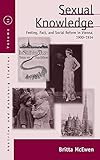Sexual Knowledge : Feeling, Fact, and Social Reform in Vienna, 1900-1934 / Britta McEwen.
Material type: TextSeries: Austrian and Habsburg Studies ; 13Publisher: New York ; Oxford : Berghahn Books, [2012]Copyright date: ©2012Description: 1 online resource (240 p.)Content type:
TextSeries: Austrian and Habsburg Studies ; 13Publisher: New York ; Oxford : Berghahn Books, [2012]Copyright date: ©2012Description: 1 online resource (240 p.)Content type: - 9780857453372
- 9780857453389
- 306.7/0943613 23
- HQ18.A9 M35 2016
- online - DeGruyter
| Item type | Current library | Call number | URL | Status | Notes | Barcode | |
|---|---|---|---|---|---|---|---|
 eBook
eBook
|
Biblioteca "Angelicum" Pont. Univ. S.Tommaso d'Aquino Nuvola online | online - DeGruyter (Browse shelf(Opens below)) | Online access | Not for loan (Accesso limitato) | Accesso per gli utenti autorizzati / Access for authorized users | (dgr)9780857453389 |
Browsing Biblioteca "Angelicum" Pont. Univ. S.Tommaso d'Aquino shelves, Shelving location: Nuvola online Close shelf browser (Hides shelf browser)

|

|

|

|

|

|

|
||
| online - DeGruyter Empire and After : Englishness in Postcolonial Perspective / | online - DeGruyter Foodscapes, Foodfields, and Identities in the YucatÁn / | online - DeGruyter Who Owns the Stock? : Collective and Multiple Property Rights in Animals / | online - DeGruyter Sexual Knowledge : Feeling, Fact, and Social Reform in Vienna, 1900-1934 / | online - DeGruyter The Cult and Science of Public Health : A Sociological Investigation / | online - DeGruyter Ethical Consumption : Social Value and Economic Practice / | online - DeGruyter Crafting 'The Indian' : Knowledge, Desire, and Play in Indianist Reenactment / |
Frontmatter -- Contents -- Acknowledgments -- Introduction: Vienna as a Laboratory for Sexual Knowledge -- Chapter 1 City Hall and Sexual Hygiene in Red Vienna -- Chapter 2 Sexual Education Debates in Late Imperial and Republican Vienna -- Chapter 3 Popular Sexual Knowledge for and about Women -- Chapter 4 Clinic Culture -- Chapter 5 Emotional Responses: Hugo Bettauer’s Vienna Weeklies -- Chapter 6 Local Reform on an Interna tional Stage: The World League for Sexual Reform in Vienna -- Conclusion: Sexual Knowledge between Science and Soc ial Reform -- Bibliography -- Index
restricted access online access with authorization star
http://purl.org/coar/access_right/c_16ec
Vienna’s unique intellectual, political, and religious traditions had a powerful impact on the transformation of sexual knowledge in the early twentieth century. Whereas turn-of-the-century sexology, as practiced in Vienna as a medical science, sought to classify and heal individuals, during the interwar years, sexual knowledge was employed by a variety of actors to heal the social body: the truncated, diseased, and impoverished population of the newly created Republic of Austria. Based on rich source material, this book charts cultural changes that are hallmarks of the modern era, such as the rise of the companionate marriage, the role of expert advice in intimate matters, and the body as a source of pleasure and anxiety. These changes are evidence of a dramatic shift in attitudes from a form of scientific inquiry largely practiced by medical specialists to a social reform movement led by and intended for a wider audience that included workers, women, and children.
Mode of access: Internet via World Wide Web.
In English.
Description based on online resource; title from PDF title page (publisher's Web site, viewed 25. Jun 2024)


